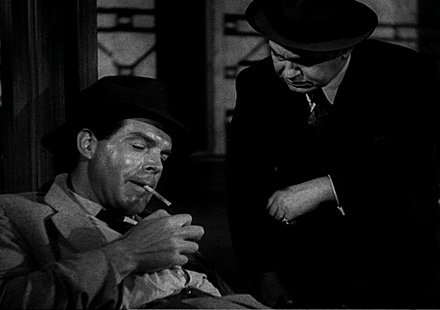SUNSET BOULEVARD
(1950, Wilder)

"There once was a time in this business when I had the eyes of the whole world! But that wasn't good enough for them, oh no! They had to have the ears of the whole world too. So they opened their big mouths and out came talk. Talk! TALK!"
It is well known that the advent of sound films in the late 1920s wasn't well received by everyone. Many silent actors resented the new technology which was dubbed by some as the "Talkie Terror". Actors that couldn't make the transition were relegated to supporting roles, and in the worst cases, slipped into obscurity. One can only imagine the impact it would have in someone's psyche to see your career vanish for something that is arguably an advance, and that you have almost no control of. That is the backdrop of Billy Wilder's 1950 film.
Sunset Boulevard follows Joe Gillis (William Holden), a down-and-out writer in Hollywood who is about to lose his apartment and his car. One day, completely by chance, he runs into the mansion of Norma Desmond (Gloria Swanson), a middle-aged, former silent movie star that now lives in seclusion, reminiscing of her days of glory, under the guard of her servant, Max (Erich von Stroheim). When Joe finds out that Norma is writing a film titled
Salomé in an attempt to make a comeback (or "a return", as she prefers to call it), he offers to doctor her script expecting some money in return. Eventually, he moves into Norma's mansion and becomes her lover; a "kept man", as they called it.
Sunset Boulevard is a story about past glories and current frustrations. Be it the down-and-out writer that "had some talent", the faded, middle-aged actress that used to be "the greatest of them all", the old director that used to be named alongside D.W. Griffith and Cecil B. DeMille, or the young female writer they tried to force into being an actress. Now that the glory days of each are long gone, each of them seem to be trying to spill some of that old glory into their lives, like fiction oozing into reality. Whether it is Joe trying to "write" a new story to his "character" by working for Norma, or Norma putting up live shows for Joe - the Norma Desmond Follies - while Max makes every single effort to "direct" and orchestrate Norma's life the way he feels more convenient.
If I were to complain about something, I would say that the relationship between Joe and Betty felt underdeveloped. But other than that, the film was an excellent showcase of great acting as far as everyone's concerned. Ultimately, in the stage of life, they all got what they wanted. Joe got a "nice" story with a twist ending, even if it was at his own expense; Max had the chance to direct the cameras one last time for Norma; and she, well she had the chance to have the eyes of the whole world on her for one last time en route for her "close-up".
Grade:








 . I did see another image of a young Dennis Hooper that was supposedly in Musso and Franks.
. I did see another image of a young Dennis Hooper that was supposedly in Musso and Franks.
 ) lover, and a nice guy to boot!
) lover, and a nice guy to boot! ) lover, and a nice guy to boot!
) lover, and a nice guy to boot!

